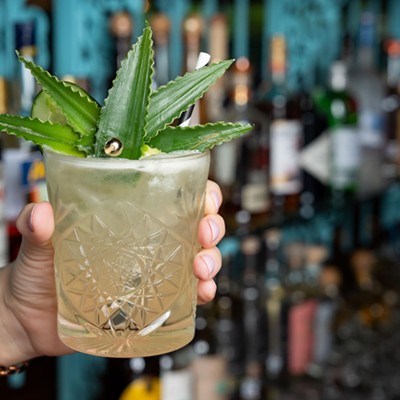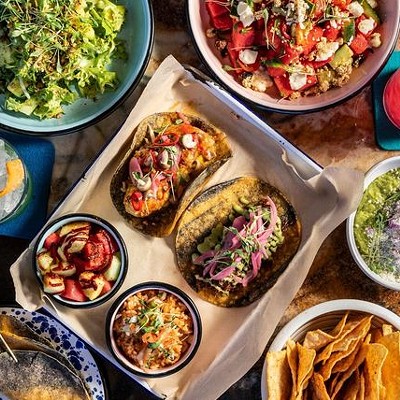Not all gummi bears are created equal. Some people - including certain unnamed members of my family - do not seem to be aware of this, and blithely purchase generic gummi bears from supermarket bulk bins. While it's hard to get angry at someone who buys you candy, off-brand gummis have a consistency ranging from squishy to gooey and a flavor palate ranging from medicinal to cloying. Yes, I take my gummi very seriously. As in, I have "a friend" who included gummis on his wedding registry.
Are gummi bears really so hard to make? The recipe for the original (and best) gummi bear, made by German confectioner Haribo, remains a closely guarded secret, much like the Coca-Cola formula, and has not changed much since its creation in the 1950s. But just as Pepsi and other competitors developed their own colas, Trolli, Black Forest, and other German candymakers soon developed their own inferior, albeit acceptable gummi bears. Some people even prefer these gummi arrivistes, just as some people prefer the inferior, albeit acceptable Pepsi. Meanwhile, the Japanese, the only real competition in the gummi game, have gone a different route, producing a stunning variety of soft, boldly flavored fruit gummis. (What is it about Axis powers and gummi?)
It wasn't until the early 1980s that gummi bears became widely available in the United States; before then you could only find them as imported goods in specialty markets and German delis. I remember the day I first tried gummi bears, which is to say I remember a world without gummi. It was a darker time. One day my father (ironically, one of the unnamed family members above) brought home a package of Haribo Gold-Bears, a gift from a co-worker who had recently returned from Germany. After one bite, I knew my purpose in life: to become an artisan working exclusively in the medium of gummi.
On a recent visit to CVS, I noticed a display bin of store-brand gummi bears. Ordinarily I avoid these like a festering pile of dead rats, but I spotted a familiar title treatment and stopped short. "The Original HARIBO Gold-Bears," the front proudly proclaimed. "Product of Turkey," the back noted quietly, adding that the candy was distributed by CVS Pharmacy of Woonsocket, RI. I'm no expert on CVS's business operations, but am fairly certain they do not have a manufacturing facility in Turkey. I then picked up a bag of Haribo Gold-Bears in the candy aisle: also a product of Turkey.
What was going on? Sure, sometimes a factory will make something sold as both a brand-name and a generic product, but I've never seen a co-branded generic sold alongside a branded item. Haribo seems to be undercutting its own brand! I probably could have found out the story with a phone call, but a taste test sounded much more fun. For good measure, I threw in Black Forest and Trolli gummis.
Haribo Gold-Bears Gummi Candy Firm at first, and after a few vigorous bites effortlessly reduces into a gelatinous mass, with a strong but not overpowering fruitiness. A beautiful spectrum of flavors: raspberry (red), strawberry (green), pineapple (white), lemon (yellow) and orange (orange), with the standouts being the raspberry and pineapple. The only downside is the slightly acidic first bite of the lemon and orange bears. This is typical of Haribo bears, and quickly recedes. An outstanding gummi. Yes, it's almost impossible to find made-in-Germany Haribo bears in America, but they still make their own candy.
CVS Gold Emblem Gummy Bears Clearly the same as the Gold-Bears. Haribo, what have you done?
Black Forest Gummy Bears More pliant than Haribo, but still nicely chewable. The advertised "real fruit juice" flavor comes through, but is accompanied by a lingering metallic undertaste that had me scraping my tongue against my teeth like a dog eating peanut butter. Black Forest only has four flavors of bears: orange, lemon, some sort of berry and apple (I think), of which the best is apple. It's been a while since I tried Black Forest gummis; I don't remember them being this bad. When first sold in the U.S., they were imported from West Germany by a high school German teacher, whose students sold them as a fundraiser for field trips. Yes, just like those $1 chocolate bars. But in 1998, the Ferrara Pan candy company (famous for Lemonheads and Red Hots) purchased the brand and moved the manufacturing to North America, and the quality seems to have taken a hit.
Trolli Sour Brite Crawlers I was unable to find any Trolli gummi bears, which ruins the apples-to-apples comparison, but might be a blessing in disguise as Trolli's main contribution to gummicraft is its invention of the gummi worm in 1981. An entirely different class of gummi; almost pillowy, yet significantly more elastic. The sour coating overpowers any fruit flavor, if there was any to begin with, but this isn't necessarily a bad thing if you like sour candies. These gummis were also once imported from Germany, but since 2005 have been made in the U.S. by Farley's & Sathers Candy Company.
The Winner The clear winner is Haribo. No surprise, for a candy that has inspired a traveling museum exhibition and an animated Disney television series. Trolli worms can be a nice change of pace though. I suppose the real winner is CVS shoppers, who can buy Haribo gummi bears for 99 cents per four-ounce package, which works out to a cheaper per-pound rate than buying in bulk at Kroger or Central Market. Unless you're willing to commit to five pounds, in which case Amazon is the way to go.
One final note: according to Haribo's own FAQs, their gummi bears made in Turkey use beef gelatin and are halal, whereas their gummi bears made elsewhere are made with pork gelatin (and are obviously not halal). But you'd never know this from the packaging. I can think of reasons not to label a halal product as such, but they aren't particularly good reasons.





